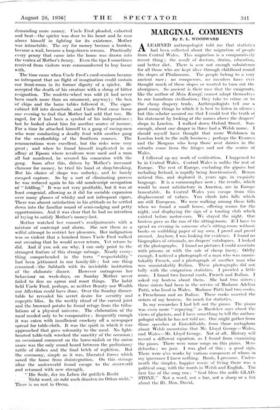AIARGINAL COMMENTS
By E. L. WOODWARD
ALEARNED anthropologist told me that statistics had been collected about the migration of people from Central Wales. This migration is a comparatively recent thing ; the result of doctors, drains, education, and better diet. There is now not enough subsistence for all those who are kept alive through childhood round the slopes of Plinlimmon. The people belong to a very ancient race ; no conquerors, no invaders have ever thought much of these slopes or wanted to turn out the aborigines. So ancient is their race that the emigrants, like the author of Mein Kampf cannot adapt themselves to our humdrum civilisation ; they take to crime or to the cheap drapery trade. Anthropologists tell one a good many things to which it is best to listen in silence ; but this scholar assured me that I could test the truth of his statement by looking at the names above the drapers' shops in London. I walked down Oxford Street. Sure enough, about one draper in three had a Welsh name. I should myself have thought that more Welshmen in London took to the milk business ; perhaps the Evanses and the Morgans who keep those neat dairies in the suburbs conic from the fringes and not the centre of Wales.
I followed up my work of verification. I happened to be in Central Wales. Central Wales is unlike the rest of Europe. The rest of Europe, excluding the gipsies but including Ireland, is rapidly being Americanised. Henan noticed this, and deplored it, years ago, in exquisite language. It is a commonplace now ; the results, which would be most satisfactory in America, are in Europe lamentable. In Central Wales you escape from this displacement of values. You climb into hills which are still European. We were walking among these hills when we found a small house, offering rooms for the night, and displaying the sign of a touring club which existed before motor-cars. We stayed the night.. Our hostess gave us the run of the sitting-room. If I have to spend an evening in someone else's sitting-room without books or scribbling paper of my own, I prowl and prowl around. Anyhow, I was looking for evidence. I found no biographies of criminals, no drapers' catalogues. I looked at the photographs. I found no pictures I could associate with prisons or with the sale of cheap finery. Oddly enough, I noticed a photograph of a man who was unmis- takably French, and a photograph of another man who was unmistakably Italian. These photographs did not tally with the emigration statistics. I prowled a little more. I found two funeral cards, French and Italian. I asked my hostess about them. She had two sisters ; these sisters had been in the service of Madame Adelina Patti, who lived in Wales. Madame Patti had two cooks, a Frenchman and an Italian. These cooks married the sisters of my hostess. So much for statistics.
In my researches I had left out the piano. The piano was even more " repaying," as Baedeker says about the views of glaciers, and I have something to tell the anthro:- pologist which he has not told me. One might gather from those speeches at Eisteddfodds, from those metaphors about Welsh mountains that Mr. Lloyd George=Wales, and Wales-=--Mr. Lloyd George. Not at all. History will record a different equation, as I found from examining the piano. There were some songs on this piano. Men- delssohn ; no jazz. I was glad of this ; a good sign. There were a!so works by various composers of whom in my ignorance I knew nothing. Bards, I presume. Under- neath the simpler, happier music of living there was a political song, with the words in Welsh and English. The first line of the song ran : " God bless the noble GLAD- STONE." Not a word, not a bar, not a sharp or a flat about the Rt. Hon. David.






































 Previous page
Previous page